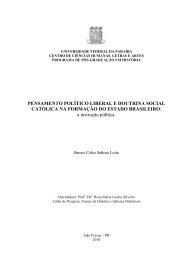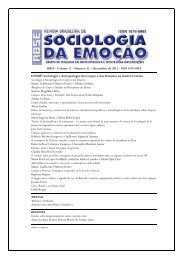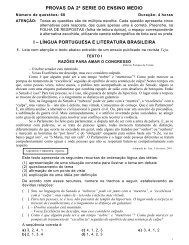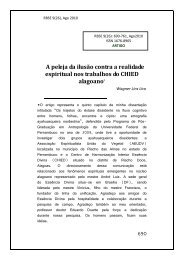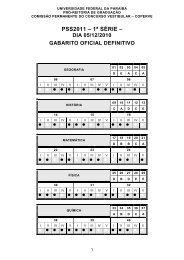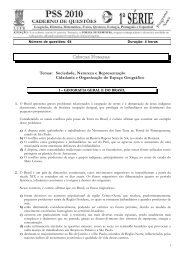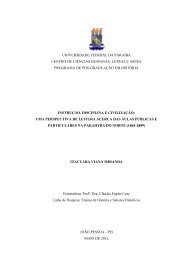abril de 2004 - CCHLA - Universidade Federal da ParaÃba
abril de 2004 - CCHLA - Universidade Federal da ParaÃba
abril de 2004 - CCHLA - Universidade Federal da ParaÃba
Create successful ePaper yourself
Turn your PDF publications into a flip-book with our unique Google optimized e-Paper software.
Generated by Foxit PDF Creator © Foxit Softwarehttp://www.foxitsoftware.com For evaluation only.No matter how rigorous and systematic the theory,method, and <strong>da</strong>ta collection, the formulation of the basicconcepts is crucial. Investing virtually all researchresources in method and/or <strong>da</strong>ta might be called theBrahe error. The mo<strong>de</strong>rn disciplines of history andlinguistics present one version of this error, to the extentthat they focus entirely on <strong>de</strong>scriptive <strong>da</strong>ta. Mo<strong>de</strong>rnpsychology presents another version, to the extent that itfocuses entirely on method: surveys, experiments andscales. These fields are single- min<strong>de</strong>d in their pursuit ofwhat was once called dustbowl empiricism. The phrasehas gone out of style, but the melody lingers on.Economics and the theory wing of sociology, on theother hand, make what might be called the Kepler error,to the extent that they focus on fanciful theories ofeconomic or social systems, as if Kepler had stayed withhis polyhedrons. Most theories in these two fields not onlylack any <strong>da</strong>ta, they are little concerned with how futurestudies might connect theory with the real world.Typical studies in human science are routinelycommitted to either the Brahe or the Kepler error. Refinedmethods like surveys, experiments, still photos, andscales, or abstract theories like evolution or exchange areunlikely to be valid as long as vernacular language is usedfor the key concepts. Ordinary language entraps bothsubjects and researchers in the myriad assumptions thatare ma<strong>de</strong> in each society. When we study and analyzetopics <strong>de</strong>fined by ordinary language, we literally don’tknow what we are talking about.Is there any way to escape entrapment in ourculture? As already indicated, one step in that directionwould be to <strong>de</strong>fine the main topics in a study in terms ofexplicit concepts, rather than using vernacular words.To even begin to attack the problem of <strong>de</strong>finingemotions conceptually, it would likely be a great help ifthe human sciences of emotion could join forces withcultural studies and at least the language disciplines ofthe humanities. The brief and casual reference I ma<strong>de</strong>above to the meanings of emotion words in French andother languages will require very <strong>de</strong>tailed andknowledgeable studies by experts on cultures and/or onspecific languages. For example, Konstan [5] has exploredthe meaning of the two basic words for shame in classic125



